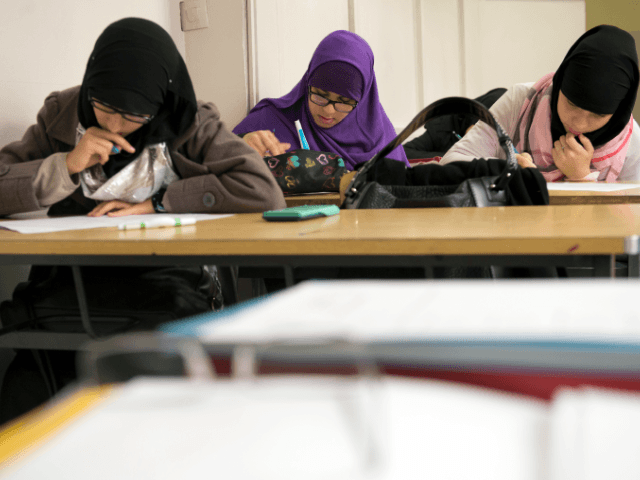U.S. Education Department Warns Schools Against Discrimination Toward Muslim and Refugee Students

LIONEL BONAVENTURE/AFP/Getty Images
A “Dear Colleague” guidance letter, signed by former U.S. Education Department (USED) Secretary Arne Duncan and Acting Secretary John King, warns school leaders against “targeting of particular students for harassment or blame,” particularly Muslim and Syrian refugee students.
According to the Washington Post, the guidance letter comes following a 2014 surveyconducted by the Council on American-Islamic Relations (CAIR)—of Muslim youth aged 11-18 in California—that found 55 percent of Muslim youth reported being “bullied” at school because of their Islamic religion during this past year.
“This is twice as high as the national statistic of students reporting being bullied at school,” CAIR reports. “Many students experienced multiple types of bullying; however, the most common type of bullying American Muslim students faced was verbal at 52%.”
As Breitbart News has reported, while CAIR portrays itself as a civil rights group, the organization has often embraced radical Islamist groups such as the Muslim Brotherhood.
The USED guidance letter—dated December 31, 2015, but embargoed until Monday, January 4, 2016—said: “[W]e are writing to enlist your help, as educational leaders, to ensure that your schools and institutions of higher education are learning environments in which students are free from discrimination and harassment based on their race, religion, or national origin.”
The letter continued:
We support your efforts to ensure that young people are not subjected to discrimination or harassment based on race, religion, or national origin, particularly at this time when fear and anger are heightened, and when public debate sometimes results in the dissemination of misinformation. Such inappropriate conduct in schools can take many forms, from abusive name-calling to defamatory graffiti to physical violence directed at a student because of a student’s actual or perceived race or ancestry, the country the student’s family comes from, or the student’s religion or cultural traditions. If ignored, this kind of conduct can jeopardize students’ ability to learn, undermine their physical and emotional well-being, provoke retaliatory acts, and exacerbate community conflicts.We cannot permit discrimination or harassment in schools against students based on their actual or perceived race, religion, or national origin, because parents and students look to you for leadership, their hearing from you that such conduct is unconditionally wrong and will not be tolerated in our schools will make a real difference. In response to recent and ongoing issues, we also urge you to anticipate the potential challenges that may be faced by students who are especially at risk of harassment — including those who are, or are perceived to be, Syrian, Muslim, Middle Eastern, or Arab, as well as those who are Sikh, Jewish, or students of color. For example, classroom discussions and other school activities should be structured to help students grapple with current events and conflicting viewpoints in constructive ways, and not in ways that result in the targeting of particular students for harassment or blame.
In mid-December, State Department official Anne Richard testified before the House Oversight and Government Reform Committee, “Four percent of all the Syrians we have brought have been Christian or other minorities.”
As CNSNews.com reports, only 53 of the 2,184 Syrian refugees admitted to the United States since civil war broke in Syria in 2011 are Christians, while 2,098 are Muslims.
Calling upon school leaders to ensure schools are “safe, respectful, and nondiscriminatory learning environments,” Duncan and King refer to ideas generated during a meeting with college campus leaders from schools throughout the country in November, which developed solutions to racism on campus such as:
- Institute a statement of values.
- Teach cultural competency.
- Make “teachable moments.”
- Lead from the top.
- Diversify leadership and faculty.
- Deal swiftly with complaints.
- Support student-led efforts.
Duncan and King let school leaders know that administrators may find their institutions’ “strongly held values” are challenged by others who create “dissonance.”
The two federal leaders urge “students, staff, and parents to report all incidents of harassment and bullying so that the school can address them before the situation escalates.”
In its survey titled, “Mislabeled: The Impact of School Bullying and Discrimination on California Muslim Students,” CAIR asserts, “Islamophobia, the fear or hatred of Islam and Muslims, in larger society filters into the school environment and manifests as teacher discrimination and student bullying.”
“The consequences of encountering Islamophobia at school are numerous,” CAIR states. “Muslim students may feel marginalized, disempowered, and begin to internalize negative stereotypes. Minority students who feel disconnected or alienated from the school environment will lack confidence, suffer academically, and fail to fully invest in their future.”
CAIR warns that “safe and inclusive school environments” must include textbooks that are “current and free of Islamophobic bias” and teachers who know “how to teach in diverse and multicultural classrooms and create inclusive environments by becoming familiar with the various religious identities of their students in addition to their racial, ethnic, sexual, and gender identities.”
No comments:
Post a Comment
Note: Only a member of this blog may post a comment.